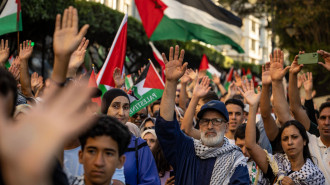Roumieh Islamists given medical attention after raid
Roumieh Islamists given medical attention after raid
Doctors have visited Islamists detained in Lebanon's Roumieh prison after their families protested against their treatment during the recent raid.
2 min read
Security forces raided Roumieh prison after the Tripoli bombing [Anadolu]
Medical staff have visited Islamists held in Lebanon's Roumieh prison after a raid [Ar] carried out by the Internal Security Forces on 12 January.
The Red Cross and a team of doctors visited the prison after protests by their families about their treatment during the raid.
The prisoners, who were being held in Block B which is reserved for Islamist and high security prisoners, were transferred to Block D during the search.
Their families accused the authorities of assaulting them and leaving them in their underwear for 48 hours after the raid.
Security forces searched the prison after they intercepted phone calls made by Islamists in Block B, and the suicide bombers who carried out a twin-bombing in the city of Tripoli in north Lebanon on 10 January.
"Medical reports showed most health problems were due to previous illnesses, but some had been caused by rubber bullets," according to source close to the Islamists.
Justice Minister Ashraf Rifi confirmed a number of officers had been arrested accused of harming detainees during the raid, according to a local source.
Rifi also reportedly confirmed Bloc B would be rebuilt within three months, and monitored landlines would be installed to allow prisoner to call their families.
Block D is a disciplinary ward where detainees are subjected to harsher conditions than those in Block B: No food is allowed from outside, and detainees cannot leave their cells, own books, watch TV, or listen to the radio.
Families held protests in Tripoli after seeing pictures leaked from the prison via smartphones after the raid. Families of other detainees who visited the prison after the raid also confirmed the Islamists were in a state of undress, with bruised faces, and some unable to move.
This article is an edited translation from our Arabic edition.
The Red Cross and a team of doctors visited the prison after protests by their families about their treatment during the raid.
The prisoners, who were being held in Block B which is reserved for Islamist and high security prisoners, were transferred to Block D during the search.
| The Red Cross and a team of doctors visited the prison after protests by their families about their treatment during the raid. |
Security forces searched the prison after they intercepted phone calls made by Islamists in Block B, and the suicide bombers who carried out a twin-bombing in the city of Tripoli in north Lebanon on 10 January.
"Medical reports showed most health problems were due to previous illnesses, but some had been caused by rubber bullets," according to source close to the Islamists.
Justice Minister Ashraf Rifi confirmed a number of officers had been arrested accused of harming detainees during the raid, according to a local source.
Rifi also reportedly confirmed Bloc B would be rebuilt within three months, and monitored landlines would be installed to allow prisoner to call their families.
Block D is a disciplinary ward where detainees are subjected to harsher conditions than those in Block B: No food is allowed from outside, and detainees cannot leave their cells, own books, watch TV, or listen to the radio.
Families held protests in Tripoli after seeing pictures leaked from the prison via smartphones after the raid. Families of other detainees who visited the prison after the raid also confirmed the Islamists were in a state of undress, with bruised faces, and some unable to move.
This article is an edited translation from our Arabic edition.

![Palestinians mourned the victims of an Israeli strike on Deir al-Balah [Getty]](/sites/default/files/styles/image_684x385/public/2024-11/GettyImages-2182362043.jpg?h=199d8c1f&itok=xSHZFbmc)


![The law could be enforced against teachers without prior notice [Getty]](/sites/default/files/styles/image_684x385/public/2178740715.jpeg?h=a5f2f23a&itok=hnqrCS4x)
 Follow the Middle East's top stories in English at The New Arab on Google News
Follow the Middle East's top stories in English at The New Arab on Google News


